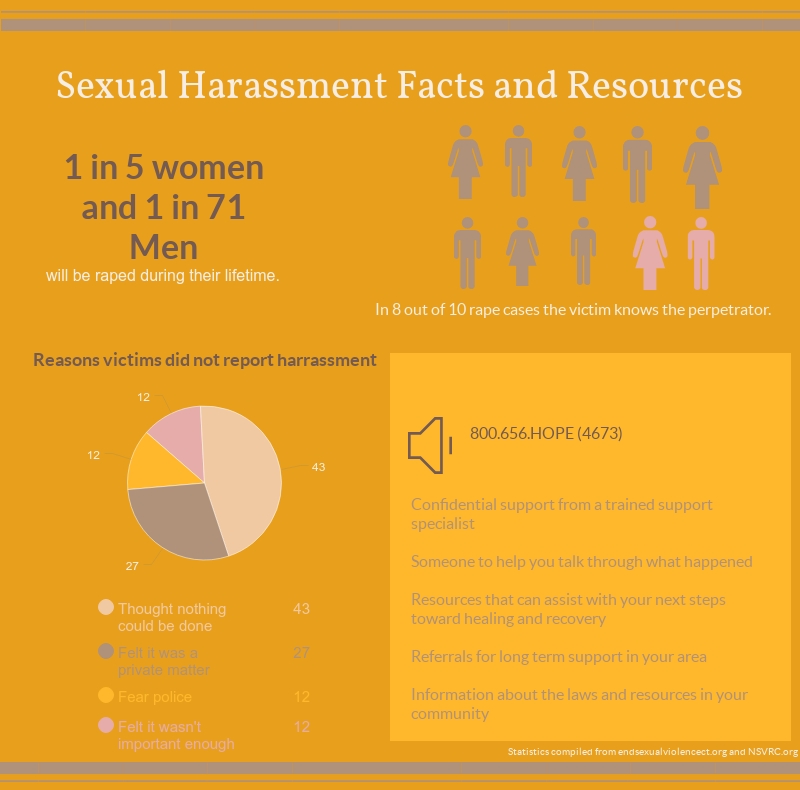“Boys will be boys”
It’s time to stop making justifications for sexual assault.
In the third grade, I remember being tackled in a game of tag with a boy because he decided to impress his friends by reaching “second base.” In middle school, I remember the competitions among the boys who would gain “points” based on how many girls they could grope. It wasn’t until my sophomore year that I realized that the inappropriate jokes, unwanted texts and touching counted as sexual harassment.
My parents raised me through the cautionary tales of the girls they knew in high school and through news articles of missing women; these detailed a dangerous reality that I needed to be prepared for. “Never walk alone at night;” “Always check below your car;” “Hold your keys in your fist;” “Never put your drink down.” These, among hundreds of other rules which quickly became instincts, were necessary in order to be safe. When I asked adults why all of my male friends were allowed to walk around the town or get later curfews, I was told that things would be different if I were a boy; girls are just raised differently.
When I was younger, I accepted the notion that my life would be different because I was a girl. That these restraints would be a part of my life and dealt with just like every other girl I knew. I hadn’t yet realized the power of feminism nor its importance, so naturally, I didn’t see a problem in cooperating with society’s pre-existing ideals. However, at some point between freshman and sophomore year, I began to notice the amount of responsibility placed on women for rape culture, and I began to comprehend the weight these responsibilities have on women’s social, political and economic lives.
Our culture has allowed sexual harassment to pass on a large scale, even within the judiciary system. In the cases of Brett Kavanaugh, Brock Turner and Harvey Weinstein, the system will often wave off claims of sexual assault or harassment and fail to give out reasonable charges — in some cases, none at all. Why do we excuse this behavior? Well, the justifications are often centered around what the victim did to deserve it, a lack of evidence or a lame excuse presented by the accused. Often we seek a gray area when defining the parameters of sexual assault rather than seeing the act for what it is — an unwarranted violation of individual freedoms.
Because it is seemingly difficult to hold the actions of the accused accountable, it often becomes the responsibility of victims to ensure their own safety. As a result, we follow the rules that we’ve learned, allowing them to weigh on our decisions. Somehow, this is considered easier than holding someone else responsible. Most dress codes in public schools have this same mentality: rather than chastising boys for sexual harassment or educating them on consent, institutions often ask girls to dress more modestly. “Boys will be boys,” they say, and this may be the case. Despite efforts to avoid showing our shoulders, thighs and midriffs, female students all over the world are still harassed both inside and outside of campuses. According to the National Sexual Violence Resource Center, one in four girls and one in six boys will be sexually abused before they turn 18 years old. That is an astonishingly high number of people, considering there are many people who are undereducated on the subject who may not even recognize what happened was assault and the amount of harassment that goes unreported.
There are many reasons why people choose not to report sexual harassment. For one, our current institutions have not proven that they can take the initiative to prevent sexual harassment. According to rainn.org, rape is the the number one underreported crime in the United States. Additionally, it’s potentially dangerous for victims to call out their attackers, especially those who have money or are in positions of power. This is often the case for victims that are male or people of color, who the system has proven time and time again to stack its cards against when it comes to judicial equality. In some cases, victims just don’t want to be defined by their situation or treated differently, and they think that it may just be easier to heal on their own. I fall into the latter group.
In eighth grade, I snuck off to hang out with an upperclassmen friend at the park. I remember walking around and friendly talking until we reached a secluded area. There, I was assaulted. I went home sobbing, and I feared telling anyone, including my current boyfriend because I thought no one would believe me. Because it was not rape, I didn’t understand that it fully mattered. This is how I learned the importance of being responsible for my own safety; I couldn’t rely on boys to understand the weight of their actions — how could I? They are raised without education on consent and harassment.
It is past time to acknowledge the epidemic in our country that is rape culture. The high rates of harassment are disheartening, and it is difficult to feel safe in an environment that normalizes harassment and difficult to speak up when even the most obvious cases of abuse are being discredited. Regardless of form, this type of behavior should not be tolerated. Rather than expecting victims to fight for themselves and accept responsibility, perhaps we should stop accepting the excuses of abusers and clearly define harassment for our institutions so that they can hold the right parties accountable. It is time we set standards for our society and grow in a more positive direction for the sake of all people, rather than excusing behavior in fear of a few.

Senior Téa McGilvray appreciates cinematography, art, and music. She plans to obtain a degree from Texas Tech for public relations and would ideally like...






